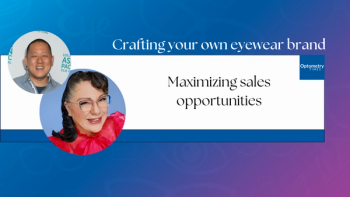
The doctor becomes the patient
During the course of caring for patients day after day, I think we become desensitized to the discomfort we inflict on our patients during the course of an eye exam. I recognize that everyone has their own fears and phobias regarding doctor's visits.
During the course of caring for patients day after day, I think we become desensitized to the discomfort we inflict on our patients during the course of an eye exam. I recognize that everyone has their own fears and phobias regarding doctor's visits. For me, it's the snap of the rubber gloves over my family physician's hands during my annual physical.
Even understanding these personal qualms, I have little sympathy for the patient who struggles with tonometry (no matter the method-air puff or applanation-they hate ‘em all) or fights to avoid the BIO light during a dilated retinal exam. I mean, come on, people. This ain’t that bad. Multiply that by the dozens of times we perform those procedures every week, and we can easily become numb to our actions.
More from Dr. Bowling:
Recently, I was strikingly reminded of those discomforts. While at the AOA meeting in Seattle, I noticed a sudden onset of flashes and floaters in my right eye. I saw the retinal specialist upon my return home and was subjected to those same tortures I routinely administer to my patients. We’ve all heard the adage that doctors make the worst patients, and I’m certain I fully measured up to that sentiment.
First, those anesthetic drops do really sting. The dilating drops do make your near vision blurry, and you really are sensitive to light. Which seems a kind of torture when you’re subjected to the dazzling lights of the slit lamp, but nothing compared to the light of the BIO.
Wow, just how damn bright can that device be?
And let’s not forget scleral depression. I got the full-bore treatment, which I am grateful for now but wasn’t so much at the time. After several minutes, my toes had curled, and I’m certain I left a permanent indentation in the arms of his exam chair from my white-knuckle grip.
His very thorough and prolonged retinal evaluation revealed a small flap tear in an area of lattice degeneration in my right eye. He recommended a laser repair, which of course was agreed to immediately. I've seen many patients undergo this procedure without much regard for what they were experiencing. I should’ve gotten a clue when the retinal surgeon suggested a subconjunctival anesthetic injection prior to the procedure.
You remember back when you were little, the nurse held up the hypodermic and told you it wasn’t going to hurt? That nurse lied. It hurt. And this doctor is recommending I have an injection for the pain prior to the procedure.
I politely declined. It can’t be that bad, I told myself, and I still had a full afternoon of patients scheduled in my office.
Related:
Girding my loins, I held my head tight against the forehead rest and firmly looked where he told me, as at that moment I had an irrational fear of an aberrant laser burn striking my macula. The surgeon placed 384 laser spots in the affected area. This gave me a new appreciation for my patients’ pain threshold. When he finished, he grinned and said, “You’re one tough SOB.” Then he asked, “So, how did that feel?”
How did it feel? Like someone stuck me with a pin…384 times. Individually, it wouldn’t have been so bad, but the never-ending onslaught of the laser magnified the experience.
Afterward, I trudged back to the office and saw my afternoon schedule-but with a greater appreciation of my patient’s trepidations. And in the future, when that patient tries to climb out of the chair because of a test I’m doing, I’ll try to be more empathetic.
Newsletter
Want more insights like this? Subscribe to Optometry Times and get clinical pearls and practice tips delivered straight to your inbox.













































